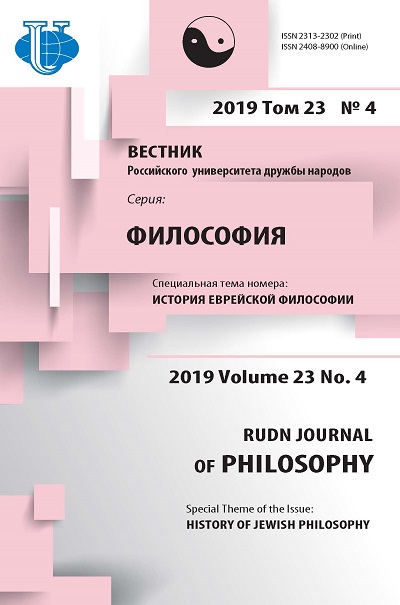Construction of Social Reality in Fiction and Phenomenology of Everyday Life
- Authors: Rudanovskaya S.V.1
-
Affiliations:
- RUDN University
- Issue: Vol 23, No 4 (2019): HISTORY OF JEWISH PHILOSOPHY
- Pages: 521-532
- Section: SOCIAL PHILOSOPHY
- URL: https://journals.rudn.ru/philosophy/article/view/22618
- DOI: https://doi.org/10.22363/2313-2302-2019-23-4-521-532
- ID: 22618
Cite item
Full Text
Abstract
The idea of the constructed character of social reality implies human contribution to institutional arrangements and cultural patterns that determine the shape of collective existence. The article examines the specific features of social construction seen and studied in phenomenological approach by A. Schutz, P. Berger, Th. Luckmann. The concept reveals significance of daily cognitive style which enables people to structure and understand the world they share with others, escaping situations fraught with gaps of meanings and anomy. The author of the article analyzes the process of social construction, distinguishing it from imaginary building of reality that goes beyond the existed order. Reality of daily life is compared with fictional society represented in J.L. Borges’ “Lottery in Babylon”. Telling about the social construction as it may be, the story demonstrates the similarities between the mental procedures that underlie real and antiutopian (inhuman) routines. The article also centers on peculiarities of phenomenological beholder’s attitude towards sociality. On the one hand, it tends to be free from any theoretical abstractions, imaginary constructions or critical destruction of reality, on the other - inclines to transcend the reified forms of social being and engenders a certain critical message.
About the authors
S. V. Rudanovskaya
RUDN University
Author for correspondence.
Email: rudanovskaya_sv@pfur.ru
кандидат философских наук, доцент кафедры социальной философии факультета гуманитарных и социальных наук
Miklukho-Maklaya Str., 6 Moscow, Russian Federation, 117198References
- Elder-Vass D. The Reality of Social Construction. Cambridge University Press; 2012. 284 p.
- Colombo A. The New Sense of Utopia: The Construction of a Society Based on Justice. Utopian Studies. 2000;11(2):181-197. URL: https://www.jstor.org/stable/20718181 (Accessed 02.07.2019).
- Popper KL. The Poverty of Historicism. Boston: The Beakon Press; 1957. 166 p.
- Berger PL, Luckmann Th. Social Construction of Reality. A Treatise in the Sociology of Knowledge. Moscow: “Medium”; 1995. 323 s. (In Russ.).
- Schutz A. The meaningful structure of the social world. Moscow: Institut Fonda “Obschestvennoe mnenie”, 2003. 336 s. (In Russ.).
- Borges JL. Lottery in Babylon. Prairie Schooner. 1959;33(3):203-207. Stable URL: http://www.jstor.org/stable/40625498 (Accessed 05.03.2019).
- Searle JR. Making the Social World. Oxford: Oxford University Press; 2010. 208 p.
- Berger PL. The Social Reality of Religion. Harmondsworth: Penguin Books; 1973. 235 p.
- Russel B. The Problems of Philosophy. Oxford University Press, 1971. URL: http://www.ditext.com/russell/russell.html (Accessed 01.12.2018).
- Smirnova NM. Phenomenology of the Social World in the Context of Contemporary Cognitive Practices. Epistemology and philosophy of science. 2005;3(1):96-120. (In Russ.)
- Podvoyskiy D. The World of Everyday Life and the “Axioms” of Practical Consciousness: Social Theoretical Prolegomena. Epistemology and philosophy of science. 2016;49(3):178-197. (In Russ.)
- Sartre JP. Nausea. Moscow, St Petersburg: Terra, Azbuka; 1997. (In Russ.)
- Gennep A. van. The Rites of Passage. Moscow: Vostochnaya literature; 1999. 198 с. (In Russ.)
- Gergen KG. The Social Constructionist Movement in Modern Psychology. American Psychologist. 1985;40(3):266-275.
- Tagirov PhV. Sex and Identity: From Binary Logic to Humanism of Plurality? RUDN Journal of Philosophy. 2016:(2):30-42. (In Russ.).
- Chistyakova OV. Media Myth Influence on “Other” Culture Formation in Russian Society (In the Context of External Migration). Scientific Almanac of Black Sea Region Countries). 2015; (1):59-64.
- Gampson WA, Croteau D, Hoynes W, Sasson Th. Media Images and the Social Construction of Reality. Annual Review of Sociology. 1992;18:373-393.
- De Torro F. Borges and the “construction” of reality. Semiotica. 2013;(195):274-304.
Supplementary files















